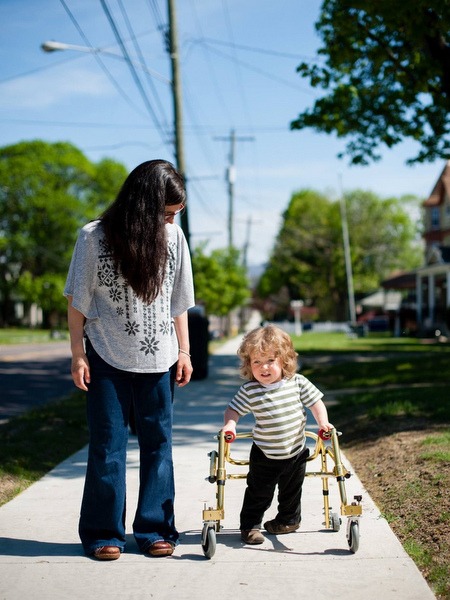I believe being the parent of a child with special needs is kind of like having a sixth sense, or as I like to say, having a special mommy superpower. We learn quickly how to defend our little ones from the awkward moments — the stares, the whispering, the pointing, the overabundant attention, and, of course, the awkward comments.
“What’s wrong with him?”
“What happened to his legs?”
“Why does he wear those things on his legs?”
“When will he grow out of it?”
I’m a big believer that most people have good intentions when they approach me about my son. My kids are cute (OK, I may be biased). They draw attention. People are curious and that’s OK with me. Older women will always ogle him and go straight for his hair, little kids are fascinated by the wheelchair and teenage girls, well, they’re the worst with their shrieking and “OMG! He is sooooo cute! Let’s take a selfie!”
I honestly believe they mean well, and, in most cases, they’re genuinely curious and interested. Some parents may get easily offended by all the attention, but we aren’t exactly the easily offended type. Nor have we ever been pegged as shy.
I would classify our family as more of the squeaky-wheel type. We are loud. We are proud. And we live our lives big.
People often say, “I don’t know how you do it” or “I could never do that.” I always laughingly reply, “I know how I do it. I’m just not sure why yet!” The truth is being a parent of child with spina bifida is just that — being a parent. You have your good days, and you have your ugly days. And you have all the roller-coaster days in between. To all the people who wonder what it’s like to have a child with spina bifida, I would tell them this:
1. We’re not always inspirational parents.
Our kid uses a wheelchair or special braces, and suddenly, we’re inspirational parents. Trust me, we’re not. We have our bad days, too. I yell too much, I cry too much, I let my kids eat too much junk food and watch too much TV. My house is a mess. On most days, we would not receive any awards for inspiration. We’re like any other parents trying to make the best life possible for our kids. If our normalcy inspires you — great. Glad to help. But we don’t see ourselves as an inspiration, we see ourselves as parents who are trying to master the juggling act of parenthood just like you!
2. I welcome questions. Please!
I’ll always remember the time my family and I went for pizza and the server asked me, “What’s wrong with him?” in reference to my son’s wheelchair. I condescendingly shot him down with a harsh “nothing is wrong with him” attitude. Looking back, it probably wasn’t my best parenting moment.
As a parent of a young child with spina bifida, I need to be an advocate for not only my kid but also for spina bifida awareness. It’s my responsibility to educate others as to what the condition actually is, not to be offended by non-eloquent questions. I believe most people are genuinely interested in my son’s condition. If I can help clear up the fog surrounding spina bifida, it will make things easier for other people to see how fascinating my child is.
3. Please don’t be sorry.
We’re not sorry. Really. I know you see his wheelchair or walker, and suddenly, you get a “bless-his-heart” look on your face with your hands over your heart. But please don’t feel sorry for us. My child leads an extraordinary life. His wheelchair and walker don’t define them. Define him by his smile, his heart and his soul. I don’t feel sorry for him. Sure, I have my moments. I may twinge a bit when he can’t keep up on the playground. But put him in the sandbox together and just watch what he can do. He doesn’t need your sorrow or pity — he needs your understanding and acceptance. And we need you to teach your children to do the same.
4. Teach your children about mine.
The wonderful thing about little ones is their natural curiosity. They see, they question, they move on. As adults, I think we could use an extra dose of that curiosity every now and then. Parents, please teach your kids it’s OK to be curious about my child. It’s OK to want to check out the wheelchair or the walker. It’s OK to ask why he wear those things on his legs. Please don’t hush your kids from asking about mine. Please don’t casually scoot by him to avoid a misconstrued, innocent comment. As a parent of a child with spina bifida, I go out of my way to make my kid feel “normal” and accepted. Please don’t go out of your way to make him feel that he isn’t. Teach your children to look past the braces and the equipment and to find the new friend who is waiting to play and have fun just as much as your child.
5. We could use a friend to lean on.
Too often I hear special needs moms say their other friends can’t relate to their children. While our experiences, milestones, triumphs and setbacks may all be different, we now, more than ever, could use a buddy to lean on. It’s so comforting to have someone in your corner.
Follow this journey on Isaac’s Big Day.


